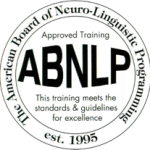Hypnotherapy
What are Hypnotherapy & NLP?
Hypnotherapy is a healing modality that engages a connection with the unconscious mind to transform unhealthy behaviors and challenging emotions. When one enters a “trance” state, similar to mediation, daydreaming or being in nature, then positive suggestions can be introduced and more easily received, to effectively create greater states of wellbeing.
NLP (Neuro Linguistic Programming) is a method of utilizing language to shift unhealthy thought patterns and limiting beliefs. This system was derived from Hypnotherapy and uses the lighter “trance” states of guided imagery and visualization.
Together, these techniques help to cultivate growth in perception, freedom from emotional triggers and lasting change.
American Board of Hypnotherapy
For Anxiety
Weight Loss
For Trauma
Emotional Intelligence
For Coping
Past Life Regression
Hypnotherapy vs. Hypnosis
Both counseling and coaching can provide transformational healing experiences for those who suffer from a variety of emotional and physical health concerns. Many of my clients find it beneficial to see me to provide support and balance, alongside working with a therapist. Below is a general guide to helping you decide which path to take for your needs.
Hynotherapy
The only difference between hypnosis and these everyday trance states is that, in hypnosis, someone induces the trance state to achieve something: healing, discovery, or stress relief, for example.
To understand the difference between hypnosis and hypnotherapy, think of hypnosis as a tool and hypnotherapy as the use of a tool. In SAT terms, hypnotherapy is to hypnotism as art therapy is to art.
The definition of hypnotherapy is clear from the word itself. Hypnotherapy is the practice of hypnosis for therapeutic purposes.
In other words, if you are a professional mental health therapist or medical doctor and you’re using hypnosis to help a client overcome a mental or physical condition, you’re practicing hypnotherapy.
Hypnosis
Hypnosis is the act of guiding someone into the trance state. Different experts define the trance state differently, but they almost always refer to:
A deep state of relaxation.
Hyperfocus and concentration.
Increased suggestibility.
If that sounds commonplace, it’s because it is. Most of us go in and out of the trance state regularly. If you’ve ever zoned out on your daily commute, fell into a reverie while listening to music, or found yourself immersed in the world of a book or movie, you’ve been in the trance state.
~ Appointments Available Worldwide – In Person, Video, or Phone ~
Discover how to simply and effectively heal your body, mind, spirit & soul.



